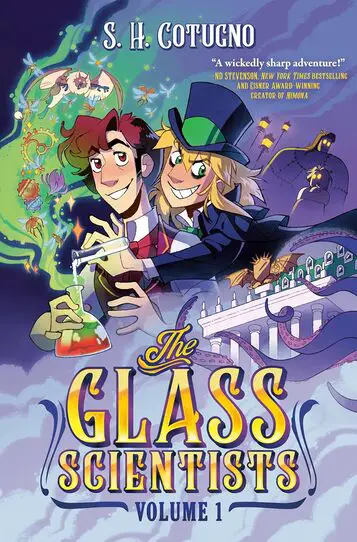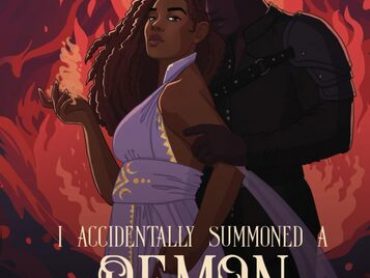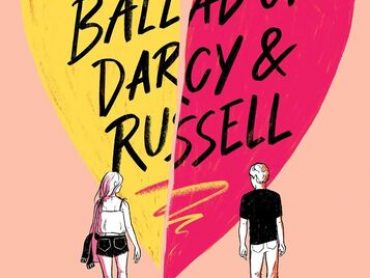S.H. Cotugno is the author of The Glass Scientists: Volume One. The Glass Scientists: Volume One follows Dr. Henry Jekyll, who believes mad scientists would thrive if they could just fix their public image. The novel explores buried secrets, mad science, and misunderstood monsters. YEM was able to speak with S.H. about what inspired the graphic novel, the public image of mad scientists, and plans for the future.
Young Entertainment: When did you first know that you wanted to be an author?
S.H. Cotugno: I wanted to be an author from the day I first learned to read, but when I was little, “author” seemed less like a job you could actually do and more like a sacred title handed down by the literary gods. I didn’t see any literary gods in my future, so I decided to pursue a career in animation instead. I was proud of the work I did on shows like Gravity Falls, Star vs. the Forces of Evil, and The Owl House, but all the while, I secretly wanted to create my own stories.
Nine years ago, I began posting The Glass Scientists as a webcomic as part of the Hiveworks network. I never expected the comic to lead to anything more than that, but in 2020, the literary gods finally smiled on me: an agent who really got the story reached out and helped find it a home at Penguin Random House.
YE: What are some words you would use to describe Dr. Henry Jekyll?
S.H.: Dr. Jekyll is a mad scientist–or gentleman rogue scientist, as he would prefer. On the outside, Jekyll is elegant, charming, well-spoken, and considerate. On the inside, he’s an anxious ball of self-doubt held together by workaholism and internalized biphobia.
Jekyll has good reason to be anxious. The city of London does not look kindly on mad scientists, and over the years, its citizens have gotten awfully good at destroying laboratories, killing monsters, and generally wrecking anything new or strange-looking. Jekyll is determined to create a safe haven for mad scientists in the heart of the city, but with superstition running rampant on the streets and his own demons threatening to obliterate all his carefully laid plans, he’s got his work cut out for him!
YE: How would you describe a day at the Society for Arcane Sciences like?
S.H.: Mornings at the Society tend to be pretty quiet, as most of its resident scientists are night owls. But if you get up early enough, you might be treated to savory pastries and a fresh pot of tea in the kitchens with Rachel, the Society’s perky day manager. As the afternoon rolls around, you will start to hear ticks, whirrs and booms spilling out from every laboratory as everyone gets to work. Things stay pretty lively until around midnight, when the scientists unwind with a round of cards or argue over the latest news out of the Royal Society–save for Jekyll, who often works alone in his office until two or three in the morning.
YE: What is the most misunderstood thing about Dr. Henry Jekyll?
S.H.: If I asked you to conjure up an image of Dr. Jekyll in your mind based purely on cultural osmosis, you might imagine a stuffy, stuck-up Victorian guy with a posh accent looking down his nose at everyone else. In other words, not a very fun or relatable guy to spend a story with.
But I see Jekyll as almost the opposite of that. He may be posh, and he’s definitely something of a perfectionist, but only because he’s painfully aware of his own imperfections. I mean, why else would he create a whole alter ego in a desperate bid to rid himself of his flaws? I hope The Glass Scientists can help readers see the depth and humanity in this often-overlooked figure of classic literature.
YE: What is the process of writing a graphic novel like?
S.H.: A unique aspect of this particular graphic novel series is that the writing process took place over the course of ten years. I wrote the outline of The Glass Scientists back in 2013 and have slowly been finalizing the script ever since, drawing the art for one chapter while hammering out the dialogue for the next. The tricky thing is that I can’t go back and make major changes to previous chapters if I change my mind down the road. Luckily, that isn’t too different from how things work in television animation, so I’m able to use experience from my day job to make surgical adjustments and improvements to the story while keeping the overall structure (reasonably) consistent.
YE: Is there any part of The Glass Scientists: Volume One that is inspired by your real life?
S.H.: Lots! I was originally inspired to dig into the story of Dr. Jekyll and Mr. Hyde as a way to explore my own mixed identity as a queer, nonbinary person. The Society for Arcane Science was inspired by the chaotic creative energy of my fellow animation students at my university, the California Institute of the Arts. And Jasper’s budding friendship with Jekyll draws from the special connections I’ve built with creative friends and collaborators over the years.
YE: What do you hope your readers take away from The Glass Scientists: Volume One?
S.H.: Since this is the first of a three-volume series, the most important thing I want is for readers to come back hungry for more! But looking at the story as a whole, I hope that anyone who worries that they don’t belong, who fears that there’s some secret, disgusting part of themselves that makes them fundamentally unlovable, will know that they aren’t alone.
YE: What advice do you have for someone that wants to be an author?
S.H.: Allow your story to grow and change as you do. I started writing The Glass Scientists in my early 20s, and it would have been suffocating if I had to stick with the exact worldview and ideas I had back then. Writer’s block is usually a sign that I no longer connect with the moment in the story I’m trying to write, and that it’s time to approach the scene from a place that feels authentic to me right now. Of course, it’s not easy to look critically at your own work without completely losing faith in yourself as a storyteller, so in those moments, I try to reconnect with whatever inspired me to write the story in the first place or reach out to a trusted friend for a fresh pair of eyes.
YE: What is your favorite scene or quote from the book?
S.H.: That would be the scene in Chapter Five where Jekyll finally stands up to Hyde after the disastrous fight with Dr. Moreau. There have been over 100 adaptations of Strange Case of Dr. Jekyll and Mr. Hyde since its first publication, and in most of them, Jekyll is portrayed as a helpless, naive victim terrorized by the demonic Hyde. I wanted to write a dynamic that was a little more balanced, where I could keep the audience guessing as to who gets the upper hand in any one scene. Readers who think they know the ending to this story may be in for a surprise!
YE: How would you describe the public image of mad scientists that Dr. Henry Jekyll is trying to fix?
S.H.: At the beginning of the story, the people of London see scientists as dangerous weirdos bent on world domination or killing God or . . . honestly, they’re not entirely sure what they’re doing, but they must be up to something! Basically, they assume the worst of scientists at all times and will jump at the opportunity to punish them for their alleged crimes against humanity. Jekyll’s challenge is to convince the public to see the scientists of the Society of Arcane Sciences as people, not monsters, even if that means laundering their image more than some of his fellow scientists might like.
YE: What is a book that has inspired you the most?
S.H.: Right now, I’m really enjoying Idlewild by James Frankie Thomas, a story about the messy friendship between two queer teens growing up at a Quaker school during the early 2000s. I went to highschool only a few years after the story takes place, and I find myself constantly cringing at the painfully era-accurate fandom lingo–the phrase Ho Yay alone sent me on a full-scale flashback to the heyday of Fanfiction.net. On a less silly note, I’ve never seen my own frustrated adolescent attempts at embodying effeminate transmasculinity captured so perfectly in prose before. It’s super validating, but also a little eerie!
YE: What do you have planned to write in the future?
S.H.: The Glass Scientists focuses in on the experience of misfit queer identity, but for my next project, I’d like to really dig into the mixed-race experience. It’s the only part of my identity that I’ve known about my entire life, and it’s also hardest part to wrap my head around. For a long time, I’ve had a character very dear to me who embodies that aspect of myself, and while I’m not quite sure what his story is yet, I’m excited to dig into it. Oh, and there’s going to be magic and ancient trickster gods, because that stuff’s fun.




